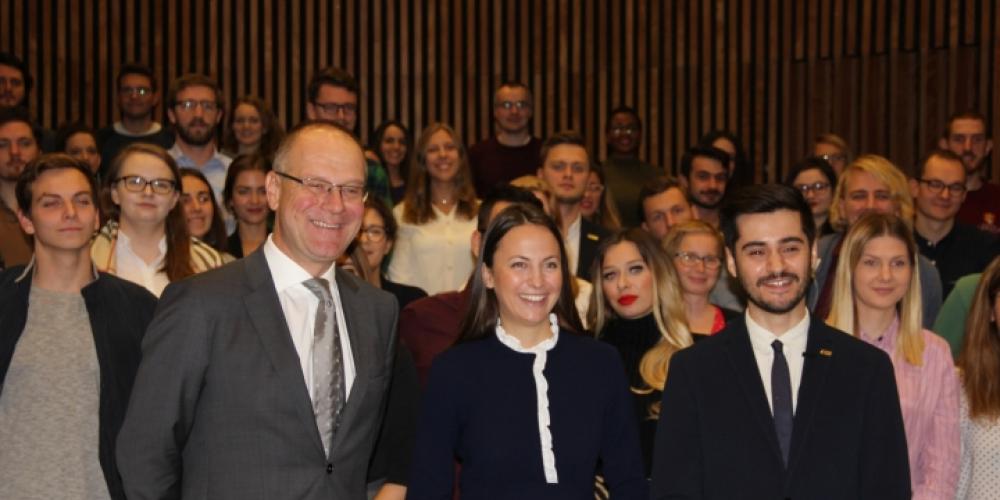
The audience consisted of some 90 ESN members from across Europe who were in Belgium for a 4-day meeting on active citizenship. They’d been hosted by ESN Belgium and had meetings across Brussels, including a visit to the European Parliament.
The point of the event was to cover a wide range of topics such as youth information, digital participation, democracy and the overall engagement of younger generations, and was part of a Erasmus in Action project.
During the first part, the EU Commissioner and MEP were asked a wide range of different questions. For starters, questions were asked on the impact volunteering has on careers, and how digitalisation would impact the labour market. Both the EU Commissioner and Maydell MEP pointed out that it is clear the labour market will be influenced by the ongoing digitalisation. The importance of digital and entrepreneurial skills should not be underestimated. At the same time, to be a better match for future employers, volunteerism is something that more young people should look at and invest time in. More and more, employers are looking at volunteering skills and taking them into account when reviewing applicants. The European Solidarity Corps is an excellent example which helps to facilitate young people (aged between 18 and 30) to volunteer abroad or in their own country. [continue reading below picture]
On the question, ‘what has Brexit taught us?’, the answers from the two speakers were unequivocal: we must foster active citizenship by stimulating critical thinking. A lot of young people were dismayed by the outcome of the Brexit referendum, but then a lot of them didn’t go out and vote. Disengagement from society was one of the many reasons that led to a pro-Brexit vote, according to Maydell MEP, and this is where fostering critical thinking among individuals is vital: we need more critical thinkers!
And what about the Erasmus project? It has created a European identity among young people, more so than any other initiative. In its 30 years existence, 9 million people have benefited from the Erasmus+ story: 4.4mln of them were students from higher education institutions; 1.8mln were staff from education or youth-related organisations; 100,000 were volunteers. It has made many young people experience what it is to be European, to make friends across the EU without borders. They experienced first-hand what Europe has to offer. They have overcome the initial fear of going abroad, away from friends and family and all that is familiar to them and studying in a foreign language. It is important that they share their stories to entice others to do the same. [continue reading below picture]
So, what else can the EU offer education, since education sits with the Member States. The EU can draw attention to important things it has observed at EU-level, such as e.g. what matters to employers, so Member States can set certain priorities while drawing up their education policy plans. And what do employers want? They want soft social skills, language skills, digital skills and entrepreneurial skills from their future employees. In other words, transversal skills, and these need to be strengthened throughout the education system, which needs to become more interdisciplinary.
One question which came back repeatedly was the call for a digital democracy. Online voting especially was a big request, and although extremely appealing, all the speakers from the EU Institutions were very reserved, mostly due to the variety of threats it poses, such as cyber-hacking, and interference from foreign bodies. As EU Commissioner Navracsics put it, “I do not believe in digital democracy. It is too vulnerable to foreign interference. Today’s social media is more a place of dishonest democracy and more one of trolling without control. Democracy means human communities, human relations and human souls and cannot be replaced by technology.” [continue reading below picture]
How then to engender active citizenship among the young? “Through the good work done by organisations such as ESN. But we need more of it”, say both Maydell MEP and Sixtine Bouygues from DG Communication. “More reaching out to those who have never engaged before; who have never done volunteer work before.” “But also, to spread the word and get more people involved, and not just at EU level, but on the local level, because that is where social inclusion and integration happen”, adds the EU Commissioner. He explained that the European Solidarity corps and the Erasmus+ programme will get more funding and there will be more volunteering opportunities in the latter as well, but the links with NGOs on the ground are vital.
Finally, the other way to stimulate citizens’ dialogue and engagement is through the EU Institutions’ public consultations. The EU’s site, Future of Europe, outlines the Commission’s white paper with five scenarios on how the Union could evolve, but it also includes a link towards public consultations and to citizens’ dialogues. It is important that Europe’s citizens realise that they have a right to vote and the best way to be actively engaged is to exercise that right and vote in the coming European elections. Voting and participating in the public consultations are the best ways for citizens to be engaged in the future of Europe and have a say in how that future looks.